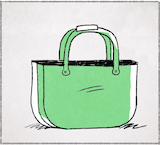
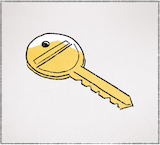
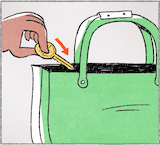
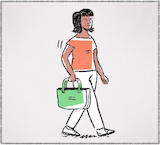
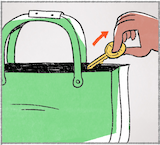
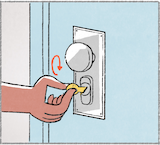
นี้คืออี่หยัง นี้คือกะเปา กะเปาใบสีเขียว ใบบักใหญ่หนึ่ง แต่กะบ่ใหญ่หลาย เบิ่งซงแล้วกะงามอยู่ แต่ว่ากะบ่งามคัก
เป็นใบสีเขียว ใบซงค้ายๆ สี่เหลี่ยม แต่ว่ากะบ่สี่เหลี่ยมหลาย กะเปาใบนี้มีหม้องจับพ้อม มีแนวถือพ้อม มีแนวถือสองข้าง
เบิ่งซงแล้วกะเปาใบนี้อาดสิเป็นกะเปาพุหญิง อาดสิบ่แม่นกะเปาของพุซาย
กะเปาใบนี้ใซ้งานจั่งใด หลือใซ้เฮ็ดจั่งใด กะเปาอันนี้กะเอาไว้ใส่สิ่งของ เอาไว้ใส่กะเปาเงิน เอาไว้ใส่เงิน เอาไว้ใส่ของหลายสิ่งหลายอย่าง เอาไว้ใส่โทละสับกะได้ เอาไว้ใส่เคี่ยงสำอางกะได้ หลือเอาไว้ใส่กุนแกกะได้
กะเปาใบนี้หาซื้อได้อยู่ใส ซื้ออยู่ใสกะได้ กะเปาแบบนี้หาซื้อได้หลายหม้องหลายที่ ซื้ออยู่ห้างกะได้ ซื้ออยู่ตะหลาดกะได้ หลือซื้ออยู่หม้องใดกะได้ที่มันมีขาย
กะเปาแบบนี้มันแพงบ่ มีลาคาแพงบ่ กะแพงอยู่ ขั้นเป็นกะเปาแบนเนมกะสิแพงอยู่ คือสิแพงคัก คือสิแพงหลายเติบอยู่
แต่ว่าขั้นกะเปาบ่เป็นแบนเนม กะสิลาคาถืก กะสิลาคาบ่แพง
16
นี้คืออี่หยัง นี้คือกุนแก กุนแกสีเหลียง
กุนแกอันนี้เอาไว้เฮ็ดหญัง เอาไว้เปิด หลือเอาไว้ล็อกได้หลายสิ่งหลายอย่าง ไว้ล็อกหลือเปิดปะตูกะได้ ไว้ล็อกหลือเปิดกะเปากะได้ สามาดเฮ็ดได้หลายอย่าง สามาดล็อกได้หลายอย่าง
กุนแกเฮ็ดมาจากอี่หยัง กุนแกบ้านหลือกุนแกลดสิเฮ็ดมาจากเหล็ก เฮ็ดมาจากสิ่งที่มันทนทาน หลือใซ้งานได้โดน
ขั้นเฮาเฮ็ดกุนแกนี้หาย กุนแกบ้านหลือกุนแกลดหาย เฮาสิเฮ็ดจั่งใด เฮาสิสามาดเปิดหลืออี่หยังได้บ่ บ่ ขั้นกุนแกนี้หาย ขั้นกุนแกบ้านหาย เฮากะเปิดบ้านบ่ได้ ขั้นกุนแกลดหาย เฮากะเปิดลดบ่ได้
แต่ว่าขั้นเฮามีกุนแกสำลอง หลือกุนแกอีกดอกหนึ่ง เฮากะสามาดเปิดได้ หลือสามาดใซ้งานได้
แต่ว่าขั้นเฮามีกุนแกดอกเดียว แล้วกุนแกดอกนี้หาย แล้วเฮาบ่มีกุนแกสำลอง เฮากะบ่สามาดเปิดปะตู หลือสามาดใซ้งานสิ่งที่สิล็อกหลือสิ่งที่สิเปิดได้
17
มีคนคนหนึ่ง เขากำลังสิเอากุนแกใส่กะเปา กุนแจดอกเดียว ดอกบ่ใหญ่ ดอกสีเหลียง เขากำลังสิเอาใส่เข้าไป หลือเขากำลังสิถิ้มใส่ในกะเปา
18
เขากำลังเฮ็ดหญัง เขากำลังญ่างอยู่ มีพุหญิงพุหนึ่ง เขากำลังญ่างอยู่ เขากำลังญ่างไปพุเดียว
ในมือของเขากำลังถือกะเปาอยู่ กะเปาใบสีเขียว เขาใซ้มือฝั่งขวาของเขาถือกะเปาใบหนึ่ง ใบสีเขียวนั้นหละ
เขากำลังญ่างไปข้างหน้า จักเขาสิญ่างไปใส เขาญ่างอยู่พุเดียวของเขา
แล้วตอนนี้กุนแกอยู่ใส กุนแกกะอยู่ในกะเปาของเขานั้นหละ เขาเอากุนแกใส่ไว้ในกะเปาของเขา แล้วเขากะกำลังญ่างไป
จักเขาสิญ่างไปใส เขาอาดสิญ่างไปข้างนอก หลือสิญ่างกับบ้าน หลือสิไปใสกะได้ จักเขาสิญ่างไปใสกะบ่ลู้นำเขาคือกัน
19
เขากำลังเฮ็ดหญัง มีคนคนหนึ่ง เขากำลังหยิบกุนแกออกมาจากในกะเปา จักเป็นกุนแกอี่หยัง เขากำลังหยิบออก จักเขาสิเอากุนแกนี้ไปเฮ็ดหญัง ฮู้แต่ว่าเขากำลังเอากุนแกนี้ออกมาจากในกะเปาของเขา
เขาใซ้มือข้างหนึ่งของเขาหยิบมันออกมา แล้วเขากำลังสิเอาไปเฮ็ดหญังกะบ่ลู้ อาดสิไปเปิด หลืออาดสิไปล็อกอี่หยังบางสิ่งบางอย่างกะได้
20
เขากำลังเฮ็ดหญัง มีคนคนหนึ่ง เขากำลังหยิบกุนแกออกมา เขากำลังสิเปิดปะตู
เขาใซ้กุนแกดอกเดียวของเขานั้นหละ ใซ้กุนแกดอกเดียวของเขา ดอกสีเหลียง กำลังเปิดปะตู กำลังสิเปิดล็อกปะตูออกมา
เป็นหญังเขาคือสิเปิดปะตู เขาอาดสิเข้าไปทางในบ้าน เขากะเลยสิเปิดปะตูกะได้
อันนี้เป็นปะตูอี่หยัง บ่ลู้คือกัน ฮู้แต่ว่าเป็นปะตูเหล็ก ปะตูสีฟ้า กอนปะตูกะสีเทาๆ บ่แม่นสีขาว เป็นสีเทา
อันนี้เป็นปะตูบ้านหลือเป็นปะตูห้อง อันนี้กะบ่ลู้คือกัน จักว่าเป็นปะตูบ้านหลือเป็นปะตูห้อง หลือว่าเป็นปะตูค็อนโด อันนี้กะบ่ลู้คือกัน อาดสิเป็นปะตูบ้านกะได้
ขั้นปะตูบ้านเฮาบ่ได้ล็อก แล้วมันสิเป็นหญังบ่ กะเป็นอยู่ ขั้นเฮาบ่ได้ล็อกบ้าน อาดสิมีโจน หลือขะโมยเข้ามาลักของในบ้านของเฮากะได้ เพาะสะนั้นแล้ว ทุกบ้านทุกหลังต้องมีปะตู แล้วกะมีหม้องล็อกปะตู เพาะว่าสิสามาดล็อกปะตู แล้วบ่สามาดให้คนเข้าได้
ขั้นสิเข้าไปในบ้านหลังนั้น ต้องมีกุนแกเปิด หลือมีแนวแก้ล็อก หลือมีแนวเปิดล็อกนั้นหละ จั่งสิสามาดเข้าไปในบ้านหลังนั้นได้
Link to overview page
Link to dictionary
| Isaan | Pronunciation | Tones | Thai | English/Notes |
|---|---|---|---|---|
| นี้ | ni: | HF | นี้ | 1. this 2. here |
| คือ | khʉ: | HR | คือ | 1. to be, to resemble, like, as 2. why {บักหล้าคือบ่เก็บโต่ะแน่ = [addressing a young boy] Why haven't you cleared the table?} |
| อี่หยัง | i:-yaŋ | H-M | อะไร | 1. what {นี้คืออี่หยัง = What is this?} {มื้อนี้เจ้าเฮ็ดอี่หยัง = What are you doing today?} {กินเข้างายกับอี่หยัง = What did you have for breakfast?} 2. something, anything, (in negations) nothing {บ่ต้องเฮ็ดอี่หยังอีกเลยนอกจากใส่ปุย = [we] don't need to do anything besides adding fertilizer} |
| กะเปา | ga-pao | M-M | กระเป๋า | bag, shopping bag, purse |
| ใบ | bai | M | ใบ | 1. leaf {ต้นไม้มีใบสีเขียว = the tree has green leaves} 2. banknote {เทิงมีใบพ้อม เทิงมีเหลียนพ้อม = there are notes as well as coins} 3. clf. for leaves, bank notes, helmets, bowls, jars, pots, boxes {ใบบัว = lotus leaf} {ก่องใบน้อย = a small box} {หม้อใบนี้มีฝาพ้อม = the pot here has a lid, too} {ถ้วยใบสีแดง = a red bowl} |
| สี | si: | M | สี | 1. color 2. colored pencil, crayon |
| เขียว | khi:ao | M | เขียว | green |
| บัก | bak | M | 1. intensifier before adjectives {ปาโตบักใหญ่ = a (very) large fish} 2. prefix in front of fruits and vegetables {บักแตงโม = watermelon} 3. can be used as a reference for a male person of the same or younger age {บักอันนี้ = this lad} |
|
| ใหญ่ | ɲai | H | ใหญ่ | large, big |
| หนึ่ง | nʉŋ | H | หนึ่ง | 1. one 2. after adjective: intensifier {บักคักหนึ่ง = very much} {อันบักใหญ่หนึ่ง = very large}, or attenuates the meaning {กะดาดมันแผ่นน้อยๆ หนึ่ง = the piece of paper is [relatively] small} |
| แต่ | tɛ: | H | แต่ | 1. but {แต่บ่ต่างกันหลาย = but not very different} {แต่บ่ลู้ว่าเขาญ่างมาแต่ใส = but [I] don't know where he's coming from, see also: แต่ว่า} 2. only {ตอนนี้มีแต่ขี้ฝ้า = now there are only clouds} |
| กะ | ga | M | ก็ | 1. then, consequently 2. also |
| บ่ | bɔ: | H | ไม่ | 1. no, not 2. question particle, transforming a statement into a question Notes: spelling exception in line with common usage on social media |
| หลาย | la:i | M | เยอะ, มาก | many, much, very |
| เบิ่ง | bəŋ | H | ดู | 1. to look at, to see, to watch {เบิ่งโทละทัด = to watch TV} {เบิ่งหนัง = to watch a movie} 2. to guess {เบิ่งซงแล้ว ... = [I] guess / from what it looks like ...} |
| ซง | soŋ | HR | ทรง | 1. shape, form 2. as if, like Notes: translation to be confirmed |
| แล้ว | lɛ:o | HF | แล้ว | 1. finished 2. already 3. and then, and next (especially แล้วกะ) 4. auxiliary for past tense |
| งาม | ŋa:m | HR | สวย | beautiful, handsome, splendid |
| อยู่ | yu: | H | อยู่ | 1. to be (located) at 2. yet, still 3. auxiliary indicating continuous or progressive action {ทอดปาอยู่ในกะทะ = (in the process of) frying a fish in the pan} {แม่กำลังเมี้ยนเฮียนอยู่ = mother is cleaning/tidying up the house} |
| แต่ว่า | tɛ:-wa: | H-H | แต่ว่า | 1. but 2. only {ฮู้แต่ว่าเขายืนอยู่พุเดียว = I only know that he's standing there by himself} |
| คัก | khak | H | intensifier: very, very much | |
| เป็น | pen | M | เป็น | 1. to be, to exist 2. to be able to 3. to suffer, sth. happens to 4. เป็นหญัง[...]คือ in initial position: why? {เป็นหญังเขากะคือแปงฟัน = Why is he brushing his teeth?} {เป็นหญังเคี่ยงบินมันคือสิตก = Why is the airplane falling down?} |
| ค้าย | kha:i | HF | คล้าย | to resemble, to be similar, to be alike {ทัพพีเป็นค้ายๆ กับซ้อน = a ladle is similar to a spoon} |
| สี่เหลี่ยม | si:-li:am | H-H | สี่เหลี่ยม | rectangle, square |
| มี | mi: | HR | มี | 1. to have 2. there is |
| หม้อง | mɔŋ | LF | ที่, แห่ง, บริเวณ | 1. place, area {หลายที่หลายหม้อง = in many places} {หม้องใดหม้องหนึ่ง = some place} 2. clf. for places |
| จับ | jap | M | จับ | 1. to grasp, to hold {เขาจับมือกัน = they're holding hands} {เขายืนจับไอติมอยู่ = she's standing, holding an ice cream} 2. to catch, to arrest {จับพุล้าย = to arrest a criminal} |
| พ้อม | phɔ:m | HF | พร้อม | at the same time, also, too {มีตะเว็นพ้อม = the sun's out, too} {กะทะมีด้ามพ้อม = the pan has also a handle} |
| แนว | nɛ:o | HR | 1. kind, sort, type 2. method, mode of action - and the corresponding tool or object, thing {แนวนุ่งห่ม = clothes, clothing} {แนวคม = sharp object [e.g., a pair of scissors]} {แนวถือ = handle} 3. clf. for words starting with แนว {กินแนวอันนั้น = กินแนวกินอันนั้น = to eat this food [which was talked about earlier]} |
|
| ถือ | thʉ: | M | ถือ | 1. to hold 2. to carry 3. to regard as, to consider {สี่สิบองสาถือว่าฮ้อน = 40 degrees Celsius is considered hot} |
| สอง | sɔ:ŋ | M | สอง | two |
| ข้าง | kha:ŋ | LF | ข้าง | 1. side {มีหูจับสองข้าง = there are handles on both sides} 2. next to {วางอยู่ข้างๆ ก่องใบใหญ่ = it's placed next to the large box} {เขายืนอยู่ข้างๆ อีกพุหนึ่ง = he's standing next to another person} 3. clf. for body parts which come in pairs (eyes, ears, legs etc.) {เขามีตาสองข้าง = she has two eyes} |
| อาด | a:t | LF | อาจ | 1. might, may, will 2. likely |
| สิ | si | M | จะ | future tense auxiliary {เขากำลังสิตื่น = he's about to wake up} {สิไปตะหลาด = [I'm] going to the market} |
| พุหญิง | phu-ɲiŋ | H-M | ผู้หญิง | woman, female |
| บ่แม่น | bɔ:-mɛ:n | H-H | ไม่ใช่ | 1. not {เขาเป็นพุหญิง เขาบ่แม่นพุซาย = she's a woman, she's not a man} 2. no |
| ของ | khɔ:ŋ | M | ของ | of, belonging to |
| พุซาย | phu-sa:i | H-HR | ผู้ชาย | man, male |
| ใซ้งาน | sai-ŋa:n | HF-HR | ใช้งาน | to use, to put to use |
| จั่งใด | jaŋ-dai | H-M | ยังไง, แบบไหน | how, in what manner {บักนาวมันมีลดซาดจั่งใด = Lime fruits have what kind of taste?} {เขาปิดแอจั่งใด = How is he switching off the A/C?} {เทียนใซ้จั่งใด = How's a candle used?} {สิใซ้จั่งใด = how is [it] used?} |
| หลือ | lʉ: | M | หรือ | or |
| ใซ้ | sai | HF | ใช้ | to use |
| เฮ็ด | het | H | ทำ | to do, to make |
| อัน | an | M | อัน | 1. thing, object 2. general clf. for objects |
| เอา | ao | M | เอา | to take, to give {เขากำลังเอาก่องไปซั่ง = he's taking the boxes to weigh them} {หมอกำลังเอายาให้คนป่วยกิน = the doctor is giving medicine to the patient} {เอาไว้ถ้า = is for, is used for, has the purpose of} |
| ไว้ | wai | HF | ไว้ | 1. to keep, to put, to place, to retain, to save, to reserve {เขาเอาหัวของเขาไว้ใส = Where does she put her head?} {หมาสิเลี้ยงไว้บ้าน = dogs are kept/raised in the house} {ไก่เลี้ยงไว้ในคอก = chicken are kept/raised in a coop} {หน้ามันบังไว้ = the face is covered/not visible} {เขาเอาโทละสับวางไว้หู = he holds the phone to his ear} 2. for {นาลิกาปุกมีไว้เฮ็ดหญัง = What is an alarm clock for?} {หม้อเอาไว้เฮ็ดแนวกิน = a pot is used to make food} {ก่องเอาไว้เฮ็ดหญัง ก่องเอาไว้ใส่ของ = What is the box for? It's for putting in stuff.} Notes: see also ไว้ถ้า |
| ใส่ | sai | H | ใส่ | 1. to put something in/on {เขาใส่บักพิกในกวยเตียวหลาย = he's putting a lot of chili in his noodle soup} {เขาบีบยาสีฟันใส่แปงสีฟัน = he squeezes toothpaste on the toothbrush} {ก่องเอาไว้ใส่ของ = boxes are there to put stuff in} 2. to wear (clothes) {เขาใส่เสี้ยแขนญาว = he's wearing a long-sleeve} 3. directed at {เอิ้นใส่กัน = to call each other/to say to each other} {หมามันเห่าใส่แมว = the dog barks at the cat} {ล้องเพงใส่ไม = to sing into the microphone} {เขากำลังซี้มือไปใส่พุซาย = she's pointing at the man} |
| สิ่งของ | siŋ-khɔ:ŋ | H-M | สิ่งของ | thing, object |
| เงิน | ŋən | HR | เงิน | money |
| ของ | khɔ:ŋ | M | ของ | thing, object |
| หลายสิ่งหลายอย่าง | la:i-siŋ-la:i-ya:ŋ | M-H-M-H | หลากหลาย, มากมาย, หลายอย่าง | varied, various, several (kinds etc.) |
| โทละสับ | tho-la-sap | HR-H-M | โทรศัพท์ | phone Notes: pronunciation: also realized as โทระสับ |
| ได้ | dai | HF | ได้ | 1. can 2. to get, to obtain 3. before verb: indicating past tense 4. บ่ได้ + verb: not |
| เคี่ยงสำอาง | khi:aŋ-sam-a:ŋ | H-M-M | เครื่องสำอาง | cosmetics, make-up |
| กุนแก | gun-gɛ: | M-M | กุญแจ | key Notes: see also กุนแจ |
| หา | ha: | M | หา | to look for, to find |
| ซื้อ | sʉ: | HF | ซื้อ | to buy |
| ใส | sai | M | (ที่)ไหน | 1. where? {สิไปใส = Where are [you] going?} {มาแต่ใส = Where are [you] coming from?} {กะทะอยู่ใส = Where's the pan?} 2. somewhere, anywhere {ใสกะได้ = anywhere, wherever you like} |
| แบบ | bɛ:p | LF | แบบ | 1. example, model, kind 2. style, form, pattern, design |
| ที่ | thi: | H | ที่ | 1. in/at {ที่นี้= here} 2. place {สิมีขายอยู่หลายที่หลายหม้อง = it is being sold in many places} {ที่นอน = sleeping place} 3. clf. for places |
| ห้าง | ha:ŋ | LF | ห้าง | shop, shopping mall |
| ตะหลาด | ta-la:t | M-LF | ตลาด | market |
| ใด | dai | M | ใด | 1. which, that one which, what, how {เขานั่งแบบใด เขานั่งขดตะหมาดอยู่ = How is he sitting? He's sitting cross-legged.} {ตอนใด = when?} 2. whichever, whoever {หม้องใดหม้องหนึ่ง = some place, somewhere} {ขั้นเฮาอยากตื่นญามใด เฮากะตั้งเวลาปุกญามนั้น = If we want to get up at a certain time, we set the alarm to that time} Notes: sentence-final often with a marked rising tone |
| ที่ | thi: | H | ที่ | 1. that, which {คนที่ยืนอยู่ฝั่งขวา = the person which is standing on the right = the person standing on the right} {เว้าคำที่บ่สุพาบ = to speak words which are impolite = to speak impolitely} 2. for ordinal numbers {ที่สาม = third} |
| มัน | man | HR | มัน | it (also used to refer to people) |
| ขาย | kha:i | M | ขาย | to sell |
| แพง | phɛ:ŋ | HR | แพง | 1. expensive 2. dear |
| ลาคา | la:-kha: | HR-HR | ราคา | price |
| ขั้น | khan | LF | เมื่อ | when, if |
| แบนเนม | bɛ:n-ne:m | M-HR | แบรนด์เนม | brand name |
| หลายเติบ | la:i-tə:p | M-LF | many, much, very (more intense than หลาย) | |
| ถืก | thʉ:k | LF | ถูก | cheap, inexpensive |
| เหลียง | li:aŋ | M | เหลือง | yellow |
| หญัง | ɲaŋ | M | อะไร, เป็นหญัง = ทำไม | 1. what {เขากำลังเฮ็ดหญัง = What is he doing?} {ธูปเอาไว้เฮ็ดหญัง = What are incense sticks for?} 2. something, anything, (nothing) 3. เป็นหญัง[...]คือ in initial position: why {เป็นหญังเขาคือใส่บักพิกลงไปในกวยเตียว = Why is he putting chili in [his] noodle soup?} {เป็นหญังหน้าต่างมันคือเปิด = Why is the window open?} {เป็นหญังมันคือมีควนไฟ = Why is there smoke?} |
| เปิด | pə:t | M | เปิด | 1. to open {เปิดหน้าต่าง = to open the window} {เปิดปะตู = to open the door} 2. to start, to switch on {เปิดไฟ = to switch on the light} {เปิดแอ = to switch on the A/C} |
| ล็อก | lɔk | H | ล็อค | 1. to lock 2. lock (noun) |
| ปะตู | pa-tu: | M-M | ประตู | door |
| สามาด | sa:-ma:t | M-HF | สามารถ | can, to be able |
| อย่าง | ya:ŋ | H | อย่าง | type, kind, sort, category |
| มา | ma: | HR | มา | 1. to come 2. auxiliary expressing action towards the present or focal time {กะคุเฮ็ดมาจากอี่หยัง = What is the bucket made of?} {แล้วเขากะเก็บเงินจากพุนั้นมา = and then she takes the money of that person} |
| จาก | ja:k | LF | จาก | 1. from {... เฮ็ดมาจากอี่หยัง = ... is made from what?} 2. to depart |
| บ้าน | ba:n | HF | บ้าน | 1. house, home 2. village (also used as a prefix before the name of a village) 3. home country, home region {บ้านเฮาเฮ็ดเข้าจั่งใด = How do we plant rice in Isaan/Thailand?} |
| ลด | lot | H | รถ | 1. car, motorized vehicle 2. vehicle, cart {ลดขายแนวกิน = food cart} |
| เหล็ก | lek | M | เหล็ก | iron, steel, metal |
| สิ่ง | siŋ | H | สิ่ง | thing, object |
| ทนทาน | thon-tha:n | HR-HR | ทนทาน | durable, lasting |
| โดน | do:n | M | นาน | time: long |
| เฮา | hao | HR | เรา | 1. personal pronoun: we 2. personal pronoun: I |
| หาย | ha:i | M | หาย | to disappear, to lose |
| สำลอง | sam-lɔ:ŋ | M-HR | สำรอง | reserve, back up |
| อีก | i:k | LF | อีก | 1. more, again 2. other, another |
| ดอก | dɔ:k | LF | ดอก | clf. for keys, nails, incense sticks {ธูปสามดอก = three incense sticks} |
| เดียว | di:ao | M | เดียว | only, alone, single |
| คน | khon | HR | คน | person, people |
| เขา | khao | M | เขา | personal pronoun: he, she |
| กำลัง | gam-laŋ | M-HR | กำลัง | auxiliary indicating continuous or progressive action |
| กุนแจ | gun-jɛ: | M-M | กุญแจ | key Notes: see also กุนแก |
| เข้า | khao | LF | เข้า | to enter, to go inside, to come/go in/on {เข้าห้องน้ำ = to go to the bathroom} {เข้านอน = to go to bed} {ขี่เลียเข้าไปเกาะ = to take a boat to go on an island} |
| ไป | pai | M | ไป | 1. to go 2. auxiliary indicating action extending into the future |
| ถิ้ม | thim | LF | ทิ้ง | 1. to leave, to abandon 2. to throw away, to discard 3. to drop, to let drop |
| ใน | nai | HR | ใน | in, within |
| ญ่าง | ɲa:ŋ | H | เดิน | to walk {เขากำลังญ่างเว้ากัน = they are walking and talking} {ลูกเป็ดญ่างไปนำแม่เป็ด = the ducklings are [walking] following their mother} {เขากำลังญ่างข้ามสะพาน = she's walking over the bridge} {เขาสิญ่างไปใส = Where is he going?} |
| พุ | phu | H | ผู้ | 1. person 2. clf. for people {พุหญิงพุหนึ่ง พุซายพุหนึ่ง = a woman, a man} {ซู่พุซู่คน = everybody} {พุหนึ่งโตจ่อยๆ พุหนึ่งโตบักอ้วนหนึ่ง = one person is slim, the other is fat} Notes: pronunciation: also realized as พู่- |
| พุเดียว | phu-di:ao | H-M | คนเดียว | 1. alone, by oneself {เขากำลังยืนอยู่พุเดียว = she's standing by herself} {เขานั่งอยู่พุเดียว = he's sitting by himself} 2. one person |
| มือ | mʉ: | HR | มือ | 1. hand 2. front leg/paw (e.g., of a cat) |
| ฝั่ง | faŋ | H | ฝั่ง | 1. side 2. river/canal bank, shore |
| ขวา | khwa: | M | ขวา | right |
| นั้นหละ | nan-la | HF-M | นั่นแหละ | auxiliary for emphasis at the end of a phrase |
| ข้างหน้า | kha:ŋ-na: | LF-LF | ข้างหน้า | in front, forward |
| จัก | jak | M | จัก | 1. answer to a question: [I] don't know, don't know exactly, [I'm] not sure {พุซายคนนี้เขาเถ้าไป่ จัก จักเถ้าหลือบ่เถ้า เบิ่งบ่ค่อยออก = Is this man here already old? I don't know. I can't see clearly whether he's old or not.} {เขาเว้ากันอยู่ใส จักคือกัน = Where are they talking? I don't know either.} 2. exact(ly), what exactly {จักต้มอี่หยังกะบ่ฮู้ = I don't know what (exactly) he is cooking} {บ่ลู้คือกันจักปาอี่หยัง = I don't know either what kind of fish this is} 3. how much/many? {ต้นไม้มีจักต้น = How many trees are there?} {ตอนนี้จักโมงแล้ว = What time is it now?} {มือของเฮานี้สิมีจักนิ้ว = How many fingers do our hands have?} 4. a bit, a little bit {จักหน่อย/จักหน่อยหนึ่ง = a bit, a little bit} |
| ตอนนี้ | tɔ:n-ni: | M-HF | ตอนนี้ | now |
| ข้างนอก | kha:ŋ-nɔ:k | LF-HF | ข้างนอก | outside |
| กับ | gap | M | กลับ | to return, (to go/come) back {กะสิตอบกับมาว่า ... = and will answer back: ...} {กับบ้าน = to return home} |
| ลู้ | lu: | HF | รู้ | 1. to know 2. to understand Notes: equivalent to ฮู้ |
| นำ | nam | HR | 1. at, in 2. with, together with {บ่สามาดถือไปนำได้ = [you] can't carry it around} {กินบักแตงโมนำเฮาบ่ = Will you eat watermelon with me?} 3. to lead, to accompany, to go with {เด็กน้อยญ่างไปนำแม่ = the daughter follows her mother} |
|
| คือกัน | khʉ:-gan | HR-M | เหมือนกัน | 1. also, likewise, similarly {ยินดีที่ได้ฮู้จักคือกันคับ = Nice to meet you too!} 2. in negative sentences: either {บ่ลู้คือกัน = I don't know either} {จักคือกัน = I don't know (either)} |
| หยิบ | yip | M | หยิบ | to pick, to pick up |
| ออก | ɔ:k | LF | ออก | 1. to go out, to leave 2. out |
| ฮู้ | hu: | HF | รู้ | 1. to know 2. to understand Notes: equivalent to ลู้ |
| บางสิ่งบางอย่าง | ba:ŋ-siŋ-ba:ŋ-ya:ŋ | M-H-M-H | บางสิ่งบางอย่าง | something, anything |
| ทาง | tha:ŋ | HR | ทาง | 1. way, direction {พุหญิงกะสิไปทางหนึ่ง พุซายกะสิไปอีกทางหนึ่ง = the woman goes one way, the man another way} {ตะเว็นไปทางใด = Where has the sun gone?} {เขาถีบจักกะย๊านไปทางหน้า = he's biking on/onward/forward} {มาเว้า มาว่าเฮาในทางที่บ่ดี = he's scolding [me], he's talking to me improperly} 2. by, through, via etc. {เว้าทางโทละสับ = to talk on the phone} |
| เลย | lə:i | HR | เลย | 1. futher on, beyond, past {เข็มน้อยเลยเลขสิบสองไป = the minute hand has passed number twelve} 2. too much 3. at all 4. definitively 5. completely, utterly |
| ฟ้า | fa: | HF | ฟ้า | 1. sky {เคี่ยงบินมันกำลังบินขึ้นฟ้า = the airplane is taking off into the sky} 2. color: blue |
| กอน | gɔ:n | M | กลอน | bolt, lock |
| เทา | thao | HR | เทา | grey |
| ขาว | kha:o | M | ขาว | white |
| ห้อง | hɔŋ | LF | ห้อง | room |
| ว่า | wa: | H | ว่า | 1. that, as {คำว่า X = the word X} 2. to say |
| ค็อนโด | khon-do: | HR-M | คอนโด | condominium |
| โจน | jo:n | M | โจร | robber, thief, burglar |
| ขะโมย | kha-mo:i | M-HR | ขโมย | 1. thief 2. to steal |
| ลัก | lak | H | ลัก | to steal |
| เพาะสะนั้นแล้ว | phɔ-sa-nan-lɛ:o | H-M-HF-HF | เพราะฉะนั้นแล้ว | therefore, for that reason, consequently Notes: pronunciation: also realized as เพาะฉะนั้น |
| ทุก | thuk | H | ทุก | every Notes: also pronounced ทุ as in ทุมื้อๆ = everyday, always |
| หลัง | laŋ | M | หลัง | 1. back, after 2. back (of body) {ขี่หลังควย = to ride on a water buffalo} 3. clf. for houses {บ้านหลังใหญ่ = a large house} {เฮียนไม้หลังเก่า = an old wooden house} |
| ต้อง | tɔŋ | HF | ต้อง | to have to, must |
| เพาะว่า | phɔ-wa: | H-H | เพราะว่า | because |
| ให้ | hai | LF | ให้ | 1. to give {หมอกำลังเอายาให้คนป่วยกิน = the doctor is giving the patient medicine} 2. for 3. to allow, to be allowed |
| นั้น | nan | HF | นั้น | that, there |
| แก้ | gɛ: | HF | แก้ | to untie, to unfasten, to take off |
| จั่ง | jaŋ | H | ค่อย (?) | then, afterwards {ต้องใซ้น้ำมันพ้อม มันจั่งสิทอดได้ = one needs to use oil as well, then one can fry [food]} |